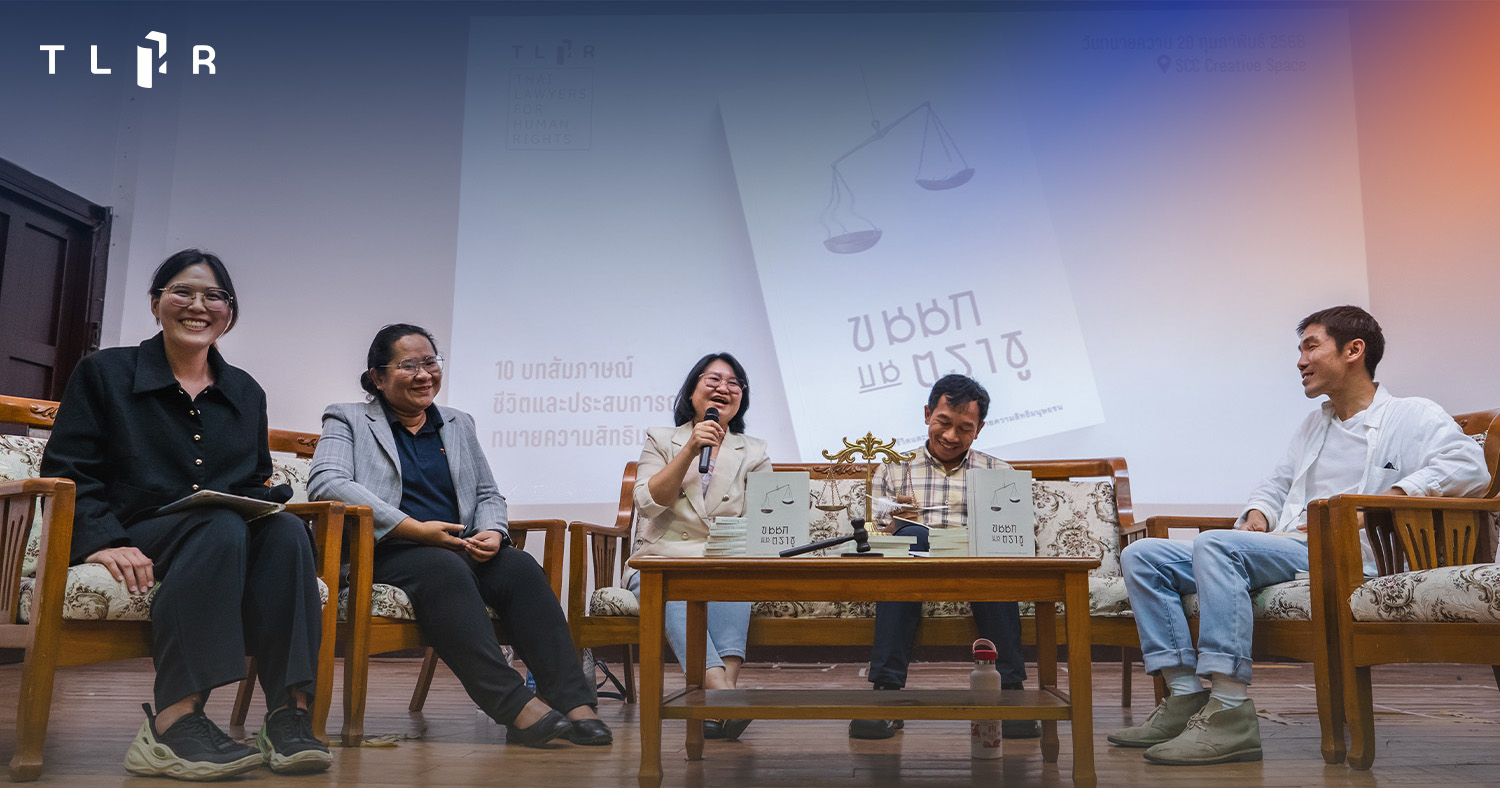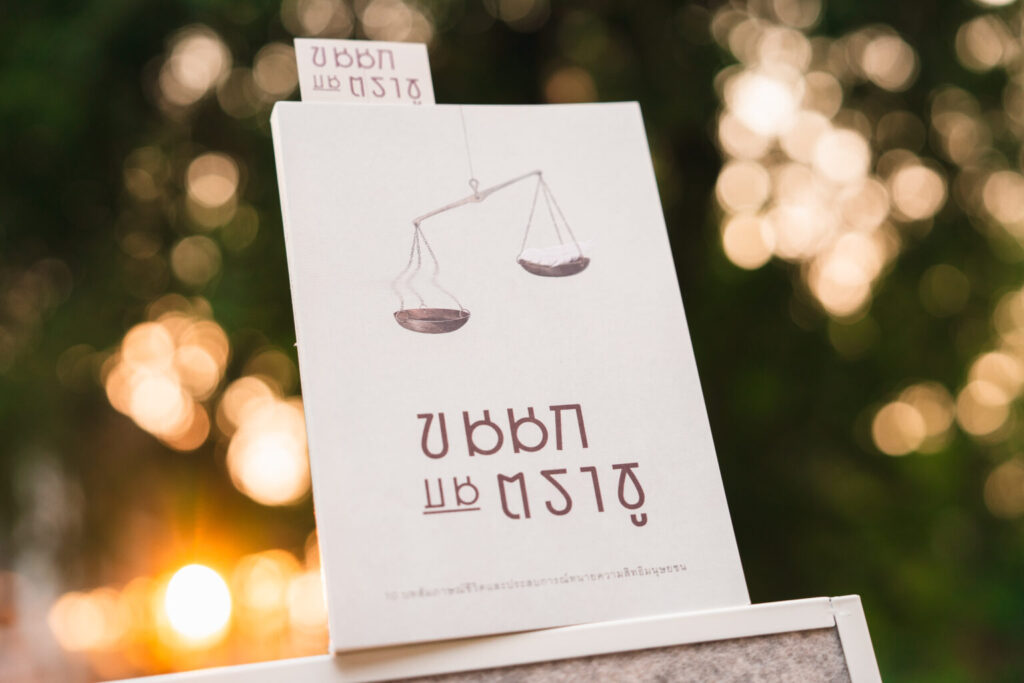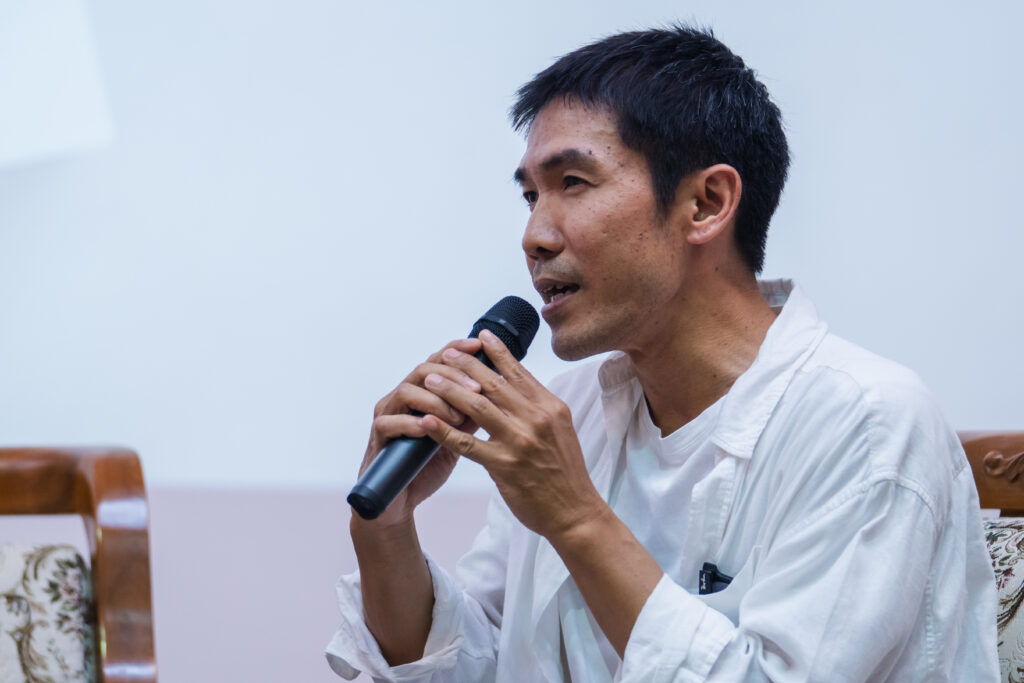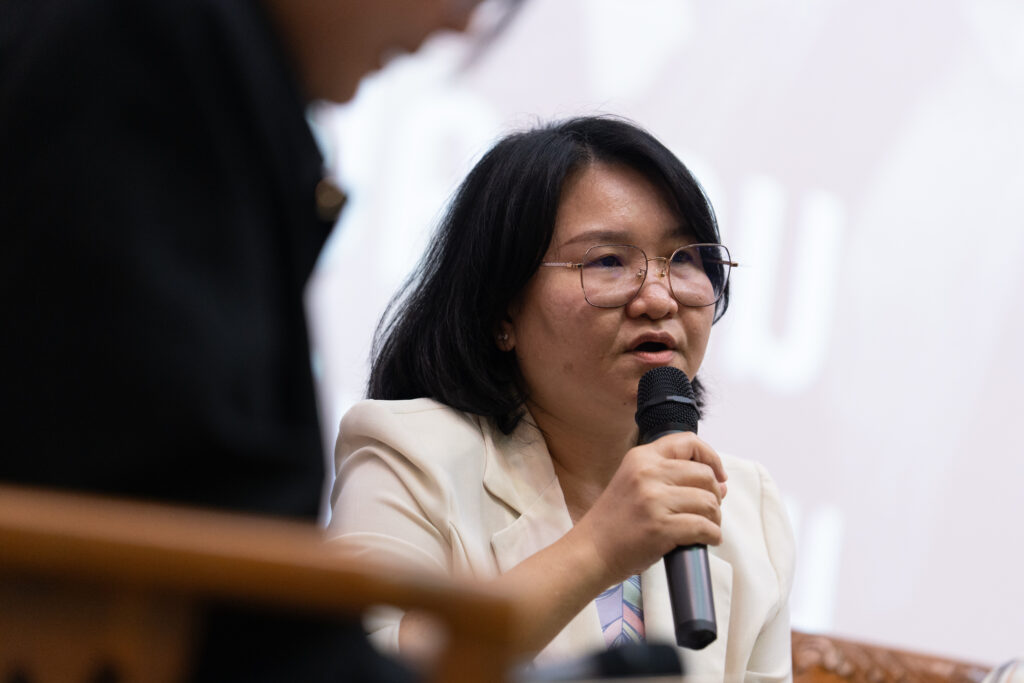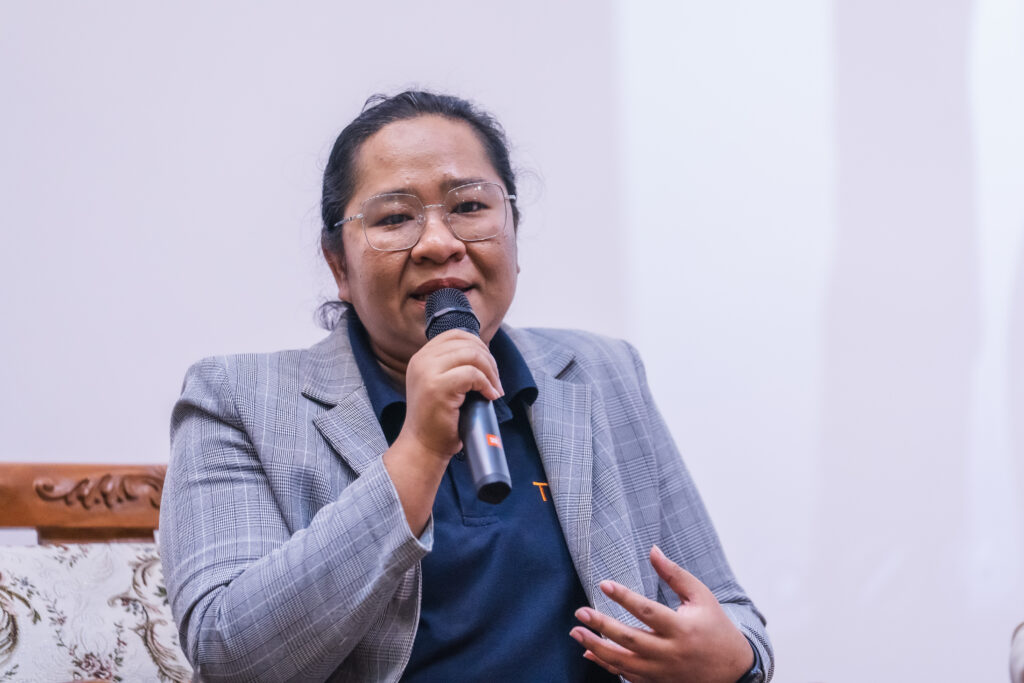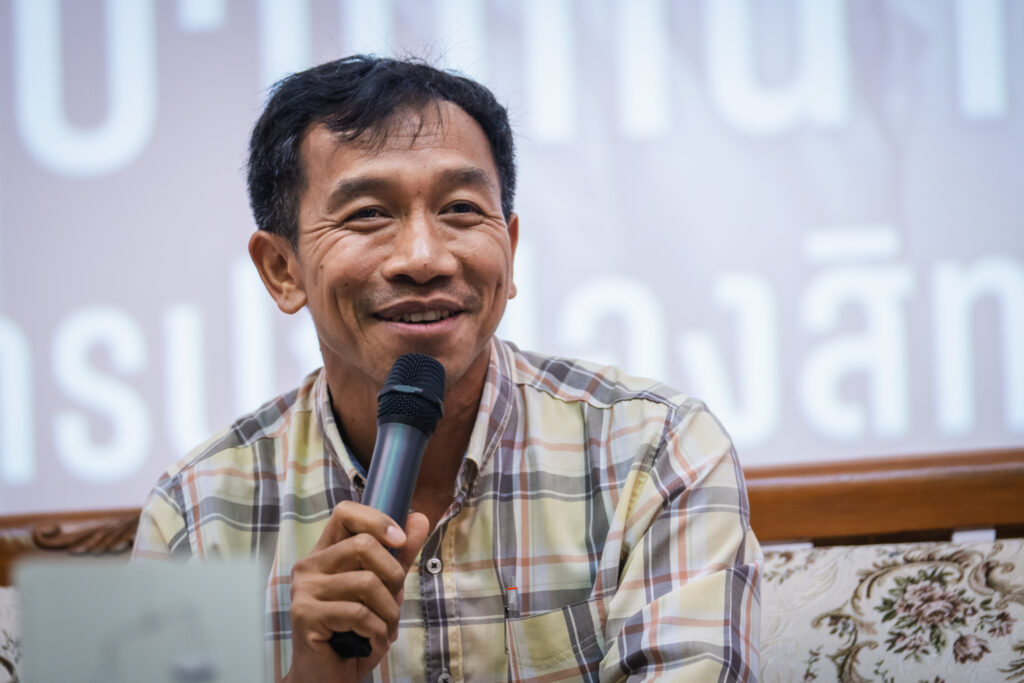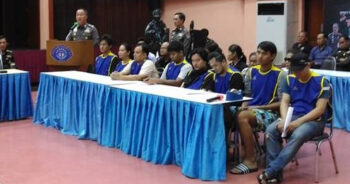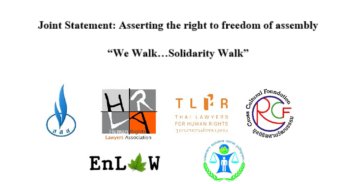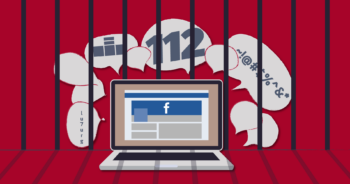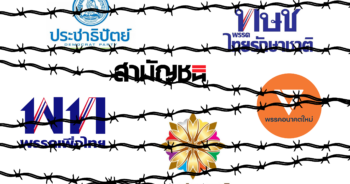February 20, 2024, marked Lawyer’s Day in Thailand, and at the SCC Creative Space in Bangkok (BTS Ratchathewi), a seminar titled “The Role of Lawyers in Protecting Human Rights” was held. The event also launched the book “Feathers on the Scales: 10 Interviews on the Life and Experiences of Human Rights Lawyers” which tells the life stories, experiences, and various perspectives on legal work for change in Thai society of 10 human rights lawyers, organized by the Thai Lawyers for Human Rights Center (watch the clip).
The panelists included Veerapong Soontornchattrawat, the editor of “Feathers on the Scales,” Khumklao Songsomboon and Junjira Junpaew, two human rights lawyers interviewed in the book, and Songkrant Pongboonjun, a lecturer at the Faculty of Law, Chiang Mai University, and former lawyer for the ENLAWTHAI Foundation (EnLaw). Wannaphat Jenroumjit, a lawyer from the Thai Lawyers for Human Rights, moderated the seminar.
Before starting the seminar, the moderator mentioned the meaning of the book’s title “Feathers on the Scales” and part of the preface for the audience to acknowledge together.
“Feathers refer to freedom, fragility but gracefulness. The scales are a symbol of justice. When these two things come together, this book is like a witness of the fighters who believe that freedom and justice must always coexist.”
“The interviews with lawyers in this book are part of the stream of justice and the importance of lawyers, through trying to persuade friends who work in interviewing to talk and write about the lives of senior and mid-level lawyers who have worked closely with the Thai Lawyers for Human Rights over the past 10 years, both in Bangkok and in the regions, who have experience working through dark times in the justice system, from the 2014 coup to the another big protest in 2020, in which a large number of people have been prosecuted for political cases until now.”
.
Human Rights Lawyers’ Work, the Work that “Serves the People”
Veerapong Soontornchattrawat, the editor of “Feathers on the Scales”, started the seminar by talking about the origin of the book, saying that it started from the Thai Lawyers for Human Rights having a project to tell the life stories and experiences of 10 lawyers to pass on to the new generation who are interested in human rights and law.
Veerapong further explained that the interview team opted for a narrative approach, allowing the writers to incorporate their own observations. This book wants to tell the life experiences of 10 people, but at the same time, we also want to see the social conditions surrounding them, how they grew up, and what was the gold or the devil of the era in which they grew up. We want to see the human rights situation in each period because all 10 lawyers come from different generations.
Veerapong mentioned that from interviewing all the lawyers, he observed a clear commonality: all ten lawyers are working to serve the people. Everyone has their own obstacles, but they are able to work, support their families, and take care of society at the same time.
“I feel that this book is like a map that allows us to see the path in the legal profession, especially for those who work in human rights. In addition, the human rights situation is told through the lawyers who use the law as a tool to help people,” – Veerapong concluded.
The concept of human rights has not been sufficiently instilled in the justice process.
Junjira Junpaew, a network lawyer at the Thai Lawyers for Human Rights and a committee member of the Human Rights Lawyers Association, talked about the background of her work as a human rights lawyer. Growing up in a lower-class family, she saw and felt a lot of injustice. She studied law because her uncle wanted her to be a judge, but when she went to study, she felt that she could not fit in with some of the cultures at the university, so she went to camp with the “Wadchapued Group” or directly translated as “Weed group”, which is an independent group in the university. During her time with the group, she studied the problems of the villagers, and environmental and natural resources issues.
Participating in such activities, she could see that law was used as a tool more than it was used to solve problems. After graduating, she became a short-term volunteer with a human rights project and worked at the Foundation for Women before becoming a first-generation volunteer lawyer. After the project ended, she founded the Human Rights Lawyers Network until the Human Rights Lawyers Association was established.
Junjira talked about the difference between the work of human rights lawyers and general lawyers. In human rights cases, which cover environmental resources cases, political cases, and consumer cases, the clients will be human rights defenders or people who choose to exercise their rights. These people aim to protect their own rights or to drive certain human rights issues to become better. As well as people who come out to protest to protect local resources in the case of a factory being built in their village. However, they are prosecuted for defamation. These are SLAPP lawsuits, which are very common.
In addition, people who come out to demand or protect their own rights do not have enough resources to fight or sue cases, so there are organizations such as the TLHR, EnLaw, or many other organizations that provide legal assistance by providing lawyers. Human rights lawyers therefore help people through these organizations, receiving pro bono lawyer fees that are not much. This is another clear difference: the compensation of human rights lawyers. In general cases, some people even go bankrupt with lawyer fees. As for how human rights lawyers survive, most of them also practice business cases along the side.
Since working in human rights, Junjira has seen positive changes in the Thai human rights movement. The 2020 protests helped push many human rights issues that society had not yet discussed or understood to be discussed, exchanged, and debated. There is a growing trend, such as the issue of gender diversity, the right to dress and hairstyle for students, or even Section 112.
But on the negative side, while the concept of human rights has been driven in the society, the government or even the justice system has not yet caught up and these institutions are being used as a tool. This is because it (the concept of human rights) has not been sufficiently instilled in the justice process or in the personnel within the justice system. When the state uses the law as a tool, it is made to disappear by judgments that do not promote the exercise of people’s rights and freedoms.
Regarding the pressure on human rights lawyers, Junjira admits that lawyers in Bangkok are not often harassed by officials like lawyers in other provinces, but what they often encounter is the use of power by judges that goes beyond their appropriate scope, which creates quite a lot of pressure.
Finally, on the issue of women in the legal field, Junjira mentioned that she had never encountered such problems. This is because the culture in the human rights sphere does not have these issues. However, she had heard from friends in the office that female lawyers may not be assigned to litigate, especially cases that require travel to other provinces. This is because if they go with male lawyers, the cost of accommodation will be wasteful due to two rooms being required.
.
If human rights lawyers do not push for democracy at the same time, other issues will not progress.
Khumklao Songsomboon, a lawyer at the Thai Lawyers for Human Rights, started by talking about the work of human rights lawyers, mentioning that in principle, being a lawyer is to uphold the Rule of Law and Principles of Law as important. Therefore, lawyers are human rights defenders. But if we talk about distinguishing them from general lawyers who work on criminal cases, civil cases, or business cases, in addition to litigating cases for clients, human rights lawyers often focus on protecting human rights, including driving the issues, such as freedom of expression, as well as helping people who belong to vulnerable groups, such as labor groups, children’s groups, and women’s groups.
Khumklao continued to talk about the process of learning human rights work. The fundamentals are the principles that protect human rights which are national laws, the constitution, and international rules. If we understand these fundamentals, we will see the problem. In the past, to understand the issues we had to bring ourselves to be at the location (where human rights violations occur), such as going to live with labor groups or labor unions, bringing about the demands of their rights both in terms of policy and litigation. But nowadays, the problem of rights violations is not limited to the location in which the violation happens, it is being communicated through social media, so the new generation can understand the problem and can work on human rights without having to be in the location.
What Khumklao clearly saw from working as a human rights lawyer is a shift in the demographics of the defendants involved in political cases. Prior to 2020, defendants were typically older, around 40 years of age and up, including those of retirement age. However, in 2020, a dramatic change occurred with hundreds of young people, aged 12 to 17-18, becoming defendants. This demonstrates a heightened awareness of democracy among the younger generation, who still hold onto hope for a democratic future. While past suppression tactics and legal battles may have discouraged public protest and expression, potentially leading people to rely more on parliamentary mechanisms, Khumklao believes that if human rights violations escalate, we must be prepared for a resurgence of youth-led protests again.
Khumklao agrees with Junjira that female human rights lawyers do not face the challenge of being barred from litigating cases. However, some defendants may express concern when the prosecutor and court officials are men. Ultimately, a lawyer’s effectiveness, regardless of gender, commits to upholding principles and advocating for the defendant’s best interests, rather than the lawyer’s own discretion or ego. The defendants would understand and be okay.
Another challenge that Khumklao has faced is the bias of the court. In political cases, if the facts of the case are clear that they (the defendants) may have been to the protest, the defendants are pressured to confess by the court. The defendants would be asked by the court first if they would like to make a confession. If they refuse, the court often suggests that the lawyer is influencing them or that they are receiving foreign funding to fight the case. Lawyers must then reiterate their ethical obligations and the defendant’s pursuit of constitutional freedoms. Falsely claiming external influence could lead to investigations and license revocation for the lawyer. However, Kumklao notes that the courts have become more understanding of human rights lawyers’ work that helps the defendants access their rights. Whichever needs to be confessed, the defendants confessed. During the years 2024-2025, the court did not ask this question anymore.
In the current social context where there are still situations of rights violations, Khumklao sees that human rights lawyers still have an important role and proposes that human rights lawyers may go deep into the issues they specialize in, such as labor, the environment, forests, and land, but must also push for freedom of expression, democracy, and political rights at the same time because if we do not push this issue, other issues will not be able to progress.
For new lawyers who are interested in working in human rights, what Kumklao wants to leave them with is that the right to bail or the principle of presumption of innocence before the court has a final judgment is important and is currently a problem. There are many detainees in political cases. If you feel that these situations are not in accordance with the law, it is abnormal, you are already half a human rights lawyer. The other half is about whether you take action to solve the problem together. The space for human rights work is waiting for people like you who feel the injustice to work together.
.
When Arnon, who is in prison, is not hopeless, we who are on the outside cannot be hopeless.
Songkrant Pongboonjun, Faculty of Law, Chiang Mai University, reflected on the book “Feathers on the Scales,” noting that it portrays lawyers who use their profession to promote social change that is aligned with their values, not just to practice the profession. These lawyers, driven by their belief in human rights, utilize the law to advocate for these rights, striving for acceptance and becoming a culture in Thai society.
After reading the stories of all ten lawyers, Songkrant saw four common issues. The first issue is the difficulty in practicing the profession, which appears in everyone’s stories, whether senior or the new generation. There is a lot of work, a lot of responsibility, little compensation, and it is difficult to take care of themselves and their families. But hardship is something that can be endured because they see the value and the importance of what they want to push, so they can still work.
Secondly, preparation for the profession. Many lawyers talk about the mind that loves justice, wants to make a change, and sees the importance of human rights, which each person obtains from different dimensions, such as family, university, or internship experience. However, lawyer Kritsadang Nutcharat believes that starting with the mind is important. But if lawyers want to employ powerful tools, that is, legal mechanisms, to effectively push the issues, they must also develop expertise in the profession.
Thirdly, Songkrant observed that many lawyers, after working for a while, gained experience and developed a more realistic perspective on the law and legal system. They come to understand that laws are not always just and that the legal system itself can be flawed. These lawyers grapple with how to address the gap between unjust laws and the reality they face. When the gap between the two is not so narrow, documenting the instances is another way to record that the legal system in our homeland contributes to the injustice. The future will determine who has a role in protecting legal principles and human rights.
Lastly, Songkrant discussed the future of human rights law in Thailand. From all the interviews, we see the development of human rights work. In the past, one office had 1-2 lawyers working together on a wide range of cases. Nowadays, the Thai Lawyers for Human Rights has 40 people including lawyers and its staff. TLHR has become a legal office for the public interest that has the most lawyers and personnel in the history of the human rights movement. This expansion signifies the growing prominence and establishment of human rights law within Thai society.
Songkrant further suggested that Thailand has approximately 60,000 licensed lawyers across the country. If we can leverage the potential of these lawyers to work for the public interest, 10-20 hours per year per person, there will be a huge number of lawyers to help with villagers’ cases and human rights cases, which this practice happens in many countries.
In closing, Songkrant highlighted excerpts from the book’s interviews, particularly lawyer Arnon Nampa’s statement: “I have never been afraid to fight in the justice system because I believe in principles. We do what is right and honest according to our profession. When faced with pressure, I have the principle that we fight with reason. If they cannot argue against us, at most they will imprison us.” Arnon also shared, “To study law and use it for the underprivileged is the highest honor for me. It may sound pretentious, but it has always been that way.” He added, “Hope is not gone. It can flicker but must not be extinguished. I will not turn back to do anything else other than being a lawyer. We must record the injustices that occur as much as possible.”
Songkrant finally concluded that when Arnon, who is in prison, is not yet hopeless, we who are outside and interested in human rights work cannot be hopeless. We must work together to push Thai society to be a society that accepts human rights as fundamental rights, has legal mechanisms and a legal system that protects human rights, and we still need human rights legal officers or human rights lawyers to be part of a powerful movement driving forces to push the country towards a fully democratic country.
